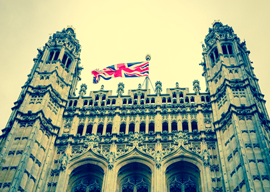
September 17, 2014

Source: Shutterstock
Thursday’s referendum in Scotland on independence from the United Kingdom is difficult for contemporary Americans to understand, since secession has been unthinkable in the United States from the moment Pickett’s Charge at the Battle of Gettysburg fell a few yards short of success. Americans, as General George S. Patton observed, love a winner and will not tolerate a loser. And secession didn”t win.
But earlier Americans appreciated that nothing human is eternal, and that political arrangements can and should be restructured to serve new needs. As an American once observed:
When in the Course of human events, it becomes necessary for one people to dissolve the political bands which have connected them with another, and to assume among the powers of the earth, the separate and equal station to which the Laws of Nature and of Nature’s God entitle them, a decent respect to the opinions of mankind requires that they should declare the causes which impel them to the separation.
On the other hand, the Scottish National Party that controls Scotland’s Parliament has yet to declare a particularly persuasive set of causes for separating from what has been, on the whole, a wildly successful 307-year-old union.
We are supposed to believe that the Scots have endured too long under the insufferably alien lash of David Cameron, Gordon Brown, and Tony Blair. Yet the names of the last three Prime Ministers of the United Kingdom suggest how powerful Scots have been in the U.K., going back to when Queen Elizabeth I handed the English throne to the Scottish Stuart royal family in 1603.
Likewise, the brilliant British political sitcom The Thick of It chronicled the bollockings of genteel English cabinet ministers by Malcolm Tucker, foul-mouthed enforcer for the Scottish Mafia that has dominated recent Labour governments. Tucker was apparently based on Blair’s spin doctor Alastair Campbell.
Arguably, thirteen British PMs have been of Scottish ethnicity on at least one parent’s side: Bute, Aberdeen, the great Gladstone, Rosebery, Balfour, Campbell-Bannerman, Bonar Law, MacDonald, Macmillan, Douglas-Home, Blair, Brown, and Cameron.
(Granted, some were more Scottish than others. Brown is impeccably Scottish by birth and upbringing. Blair was born and went to public school in Edinburgh, but also spent some of his childhood in Australia and England. Cameron’s wealthy paternal family illustrates Dr. Johnson’s gibe to his Scottish biographer James Boswell that “The noblest prospect which a Scotsman ever sees is the high road that leads him to England.” But facilitating escape from their far northern land has been a major privilege of Scotland’s voluntary union with England.)
Similarly, the Scots were disproportionately represented in running the British Empire: for example, seven of the twelve Viceroys of India were Scots. Imperialists, business tycoons, and engineers of Scottish descent spread golf around the world.
The domineering concept of our times, however, is anti-majoritarianism, the righteous revolt of the fringes, even (or especially) if the group in question is not terribly marginal, as in the case of Scots, Jews, women, and gays.
We live in an era when the reasonably powerful pretend to be oppressed African-Americans circa the era of Martin Luther King. As far as I can surmise, moral legitimacy in current Anglo-American thought is determined by relative social distance from the Prince of Wales: e.g., Princess Diana was a plucky underdog because, while she was a Princess, she wasn”t Prince Charles. (By the way, Alex Salmond, leader of the Scottish National Party, promises that an independent Scotland would retain its link to the Windsor royal family, which has become quite popular again due to two generations of marriage to attractive women.)
Indeed, the Scots have been constitutionally privileged over the English since the devolution in 1999 under Blair’s government of control over internal Scottish matters from the British Parliament to the new Scottish Parliament. In contrast, there is no English parliament in which only Englishmen decide matters pertaining only to England.
In 1977, Tam Dalyell, an anti-devolutionist Labour MP from Scotland’s West Lothian, asked what the intensely logical Tory Enoch Powell christened the West Lothian Question:
For how long will English constituencies and English Honourable members tolerate … at least 119 Honourable Members from Scotland, Wales and Northern Ireland exercising an important, and probably often decisive, effect on English politics while they themselves have no say in the same matters in Scotland, Wales and Northern Ireland?
The answer so far has been: indefinitely. The English represent the majority in the United Kingdom, and thus their dominance is, under current ways of thought, illegitimate and oppressive, indeed no doubt racist.
The West Lothian question remains of interest to those concerned with fair play, but their numbers are scant in an age more given to considering politics in terms of what Lenin memorably called the questions of “Who? Whom?”
For example, I spent a considerable amount of time trying to figure out if former Labor PM Gordon Brown”currently the MP for Kirkcaldy and Cowdenbeath and as of the last week the chief spokesman against the independence referendum”would be ejected from the Westminster Parliament as a foreign national if Scotland becomes a separate country.